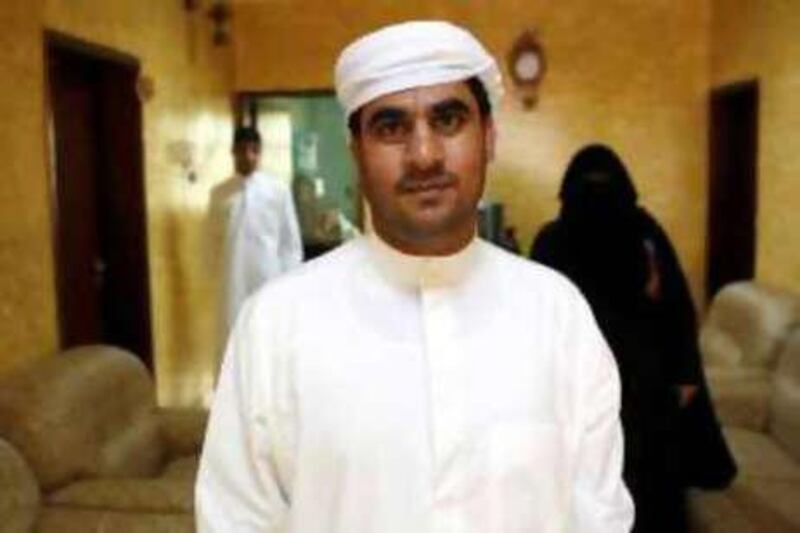Throughout his 28 years, Essa Abdullah Jelal has been denied the right to travel beyond the UAE's borders. In fact, no member of his family has ever been able to leave the UAE. The Jelals are bidoons - literally, "without". "We are prisoners," says Mr Jelal. "I am the son of a bidoon, and so I never had any legal citizenship papers and nor will my children unless the UAE gives us citizenship."
Along with many of the estimated 100,000 stateless people like him in the UAE, Mr Jelal rushed eagerly to one of the registration centres set up by the Government at the beginning of September to resolve his status. "We have a chance now to be treated like everyone else, like human beings," he says. Mr Jelal lives in Ras al Khaimah and works as a driver for one of the emirate's sheikhs. In the "nationality" field of his driving licence, it says: "Does not carry nationality papers."
His family is originally from Iran, but moved to Ras al Khaimah in the 1950s before the emirates were united under one flag. "We don't speak Farsi, we speak Arabic, and our allegiance is with the UAE," says Mr Jelal. He says his grandfather lost the family's legal documents during the journey to the UAE and, ever since, the Jelals have struggled to become part of the community. "A bidoon is not accepted anywhere, sometimes we are treated like the untouchables in India," he says.
Now that the registration window has closed, Mr Jelal and all the others like him face a wait of uncertain duration to discover whether or not their applications have been successful. "I have only known the Emirates, it is my home," he says, nervous about the outcome. Others are more confident. Sitting in a traditional home in Ras al Khaimah surrounded by her five children, Amna Hassan cannot stop smiling and thanking Allah. She believes the plight of her five children is finally over.
"They will be getting their rights, finally they will be accepted by other Emirati children," says Mrs Hassan, who is an Emirati married to a bidoon. Mrs Hassan believes her case will be viewed as less complicated by the authorities and that citizenship for her children is certain as one of their parents is Emirati. Her husband and her children registered in Abu Dhabi. They stood in a queue for four hours but say it was worth it and remain optimistic that they will soon be getting good news.
"I just feel it, I feel things will be better from now on," says Mrs Hassan. Before the 1970s the word "bidoon" did not exist, she says: "Identity cards and legal documents didn't really matter here before the union, we were all members of one tribe or another and never asked about citizenship. "When my husband came and asked for my hand in marriage in 1969, I didn't check if he had legal papers; he was a good man and that is why I married him."
Mrs Hassan's husband works at a police station where he earns Dh2,000 a month. "He would be making more if he wasn't a bidoon," she says. Besides the low income, having a stateless husband causes much hardship for the family, whose children are considered bidoon and are treated as such. "They can't get education beyond high school and can't find professional jobs, can only work jobs like that of a labourer, even though they look and talk and walk like an Emirati," she says.
Mrs Hassan's children do have their medical expenses covered; that, she says, was thanks only to help from her Emirati family, who have contacts at the Ministry of Health. "Others in the same state as I weren't as lucky," she says. Mrs Hassan says her older children, such as Ali, in his 20s, cannot find partners to marry. "No one wants to marry my son as he is a bidoon; it just breaks my heart for my children to be such outcasts from their Emirati community."
Omar, her 15-year-old son, says all he ever wanted to do was join the football club and play football with other boys his age. "They don't want me in their club," he says, tears welling in his eyes. "I am like them, no different, I just don't have the papers to prove it." The entire family is dressed in traditional Emirati clothes, with the women in abayas, and the men in kanduras. Freej, the popular Emirati animation series, plays on the television in the background.
"Look," says Mrs Hassan, "how are we different than the other Emiratis who were lucky to get registered as the union was formed?" She hopes that, with registration now complete, no other families will have to endure what hers has. "It is long overdue, and for the safety of this country and its people, they finally did it," she says. "Giving people basic rights gives them a sense of loyalty to a place."
Now the Hassans, and all the other stateless inhabitants of the country, face an anxious wait. "The UAE is our home, there is no other place for us to go," says Omar. "I don't want to go anywhere else, I love my home." rghazal@thenational.ae






